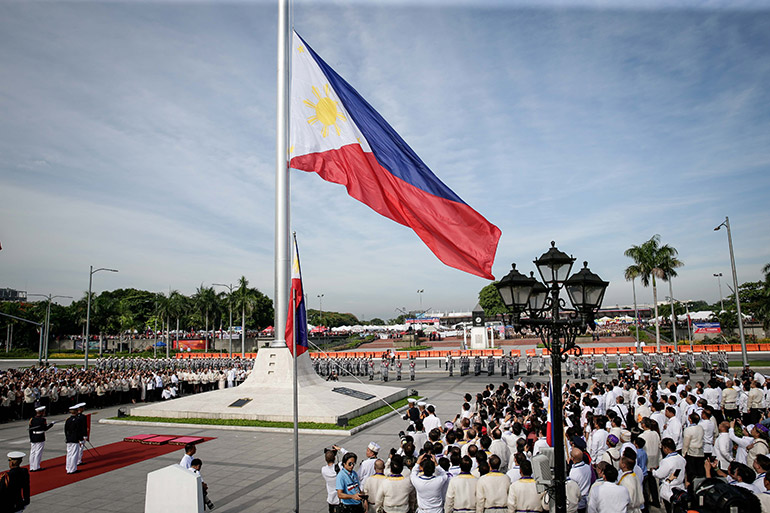Proposed law comes amid wave of nationalism in the Philippines that has also seen calls for the country to change its name

Filipinos could be jailed for up to a year and fined between $1,000 and $2,000 for failing to sing the national anthem “with fervor”, if a proposed law is passed.
The law, which stipulates that the anthem, Lupang Hinirang – meaning chosen land – must be played between 100 and 120 beats per minute and requires students to memorise the song, was passed by the House of Representatives of the Philippines on Monday and will now be sent to the Senate for approval.
“Any act which casts contempt, dishonour or ridicule upon the national anthem shall be penalised,” says the bill, which outlines a long list of rules about the nation’s anthem, flag and pledge of allegiance.
“When the national anthem is played at a public gathering … in any format, the attending public shall sing the national anthem. The singing shall be mandatory and must be done with fervor,” the law says. “At the first note, all persons shall execute a salute by placing their right palms over their left chest.”
Offenders would be named and shamed in a national newspaper along with other punishments outlined in the bill.
The passing of the bill in the House comes just weeks after the Filipino lawmaker Gary Alejano, a representative for Magdalo, filed a separate bill to create a commission to rename the country.
“If we want to be truly independent, then we should throw away the bonds of colonialism by establishing our own national identity,” said Alejano, alluding to the previously colonised country being named after King Philip. “For our country to move forward, we should identify a name for our country that genuinely reflects our national aspirations, a name that signifies our values and self-determination.”
Such developments are indicative of the country’s recent lurch toward nationalism, a trend both fueled and exploited by the country’s controversial leader, Rodrigo Duterte, who came to power last June.
A key theme of the former mayor of Davao’s presidency has been his purported commitment to reaffirming the country’s sovereignty in the face of continued interference from foreign powers. Most notably, he has railed against the US, threatening on numerous occasions to “separate” from the superpower, which has historically enjoyed deep ties with the Philippines, and move closer to Moscow and Beijing.
Last September, just weeks after calling then US president Barack Obama a ‘son of a whore’, the pugnacious president said he wanted all US troops to leave the country’s troubled south.
“They have to go. In Mindanao, there are so many American [troops] there. They have to go. We will reorient our foreign policy,” he said of the island in the country’s south. “For as long as we stay with America, we will never have peace in that land [Mindanao]. We might as well give it up.”
However, the US continues to play an important role in counter-terrorism activities in the Philippines. Most recently, the US has been providing assistance to Philippine troops in the fight against Islamic State-affiliated troops in war-torn Marawi City on Mindanao, assistance that the Philippine military was reluctant to make public.
Philippine General Restituto Padilla broke the silence around US involvement in Marawi on 14 June, telling the New York Times that American troops were there, but were “not allowed to join combat”.
Padilla’s comments came just days after Duterte told reporters that he had “never approached America” for help and was unaware of a US military presence in Marawi, fuelling speculation that the Philippine military did not consult Duterte before reaching out to their US counterparts.
Prison time looms for Filipinos that fail to sing national anthem “with fervor”
Proposed law comes amid wave of nationalism in the Philippines that has also seen calls for the country to change its name The Philippine national flag is raised during ceremonies marking Independence Day at Luneta Park in Manila, Philippines, 12 June 2017. Photo: EPA/Mark R. Cristino

